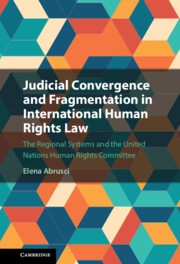 Judicial Convergence and Fragmentation in International Human Rights Law
Judicial Convergence and Fragmentation in International Human Rights Law from Part II - Factors Explaining Judicial Convergence and Fragmentation
Published online by Cambridge University Press: 22 December 2022
Considering that judicial fragmentation and convergence concern the interpretation of human rights norms and provisions, this chapter discusses how the human rights bodies under analysis engage with the theory of treaty interpretation. In particular, the chapter illustrates how the human rights systems are engaging differently with judicial dialogue. Through a detailed analysis of the practice of each body, this chapter shows how judicial dialogue led to convergence and how the lack of it led to fragmentation. However, the chapter also highlights situations where despite judicial dialogue fragmentation still arose, discussing the duality and complexity of this instrument for the maintenance of convergence.
To save this book to your Kindle, first ensure [email protected] is added to your Approved Personal Document E-mail List under your Personal Document Settings on the Manage Your Content and Devices page of your Amazon account. Then enter the ‘name’ part of your Kindle email address below. Find out more about saving to your Kindle.
Note you can select to save to either the @free.kindle.com or @kindle.com variations. ‘@free.kindle.com’ emails are free but can only be saved to your device when it is connected to wi-fi. ‘@kindle.com’ emails can be delivered even when you are not connected to wi-fi, but note that service fees apply.
Find out more about the Kindle Personal Document Service.
To save content items to your account, please confirm that you agree to abide by our usage policies. If this is the first time you use this feature, you will be asked to authorise Cambridge Core to connect with your account. Find out more about saving content to Dropbox.
To save content items to your account, please confirm that you agree to abide by our usage policies. If this is the first time you use this feature, you will be asked to authorise Cambridge Core to connect with your account. Find out more about saving content to Google Drive.